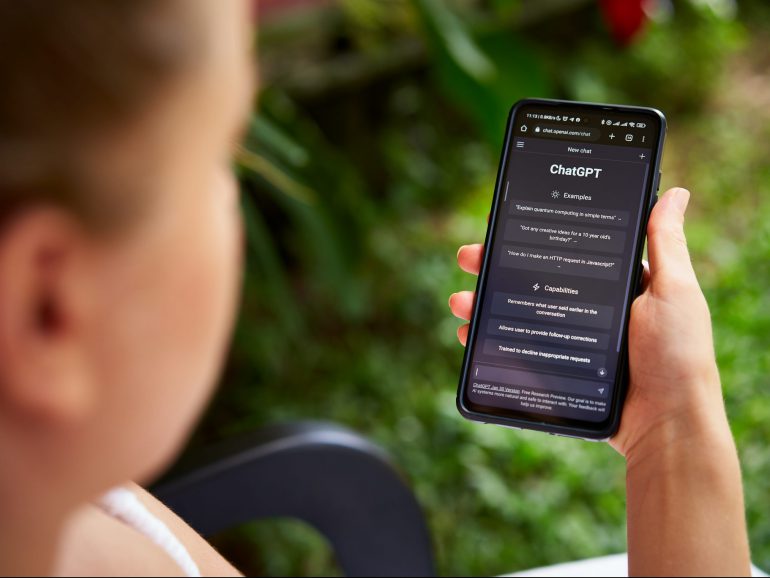The discourse around generative AI in higher education has heard from academics, researchers, and thought leaders – but the student voice has been largely missing. In early March, we held two forums where students from across the University shared their insights about what ChatGPT means for their study and their future. With over 450 live participants, we weren’t able to get through all the pressing questions from the audience, so we asked some of the panellists to follow up with their thoughts.
In the first part of this series, read what students had to say about your top questions on the use of generative AI in assessments and their future. Read all their answers below, or jump to a particular question of interest.
- ChatGPT has been a hot topic for teachers. What has been the response from your peers? Are they interested? Do they care much about it? Will they use it?
- What’s been your experience using ChatGPT? What have been some of the pros and cons in your experience?
- Would you like to see AI allowed as a tool for you to use to complete assessments? Why or why not?
- Take us through how you would approach doing an assignment using ChatGPT (assuming it is allowed). What steps would you take as a student?
- If a student can’t, by themselves, produce quality responses to an assessment, should they really be using AI to assist? That is, how do we ensure that students learn what they need to learn, even though AI is available?
- As a student, if you DON’T use generative AI, do you feel you would be at a disadvantage?
- How would you feel if your teacher used ChatGPT to provide assignment feedback to you?
- If AI-assisted tools were routinely used to study and help with completing assessments, would future employers have confidence in your own knowledge and capability?
- Do you see yourself using AI in your future workplace? What do you think that would look like?
General experience and reactions
ChatGPT has been a hot topic for teachers. What has been the response from your peers? Are they interested? Do they care much about it? Will they use it?
Students seemed polarised here – some were already quite reliant on it while others were more unaware or cautious. “My peers are interested, they have played around with it and seem to intend to use it but they do not fully understand it at this stage and neither do I. We are all still in the experimental phase, testing out how useful it is,” said Isabella, a 5th year Law student. Some students had some awareness of ChatGPT’s limitations; “When I talked to my friends about it, they seemed not really interested as they do not trust the answers given by it,” said Marisse, a 4th year student in the Faculty of Medicine and Health. A similar perspective was provided by Victorian, a 3rd year student from Business who said, “no one is relying on it to get work done because the answers we require are so much more complex and nuanced”.
On the other hand, some students were already experiencing substantial gains from ChatGPT and other AI. “My peers are definitely interested in ChatGPT and its benefits in aiding our learning. This is mostly through ChatGPT’s abilities to explain complicated concepts in a simple manner. This helps tremendously with our engineering courses which are often full of difficult and mathematical topics,” said Girisha, a 2nd year student in Engineering. But, her peers were keen to uphold integrity: “[they] care about ChatGPT but are not willing to use the tool for writing entire assignments as they are insistent on maintaining academic integrity.” Connie, a 3rd year student from Architecture, Design and Planning, had a similar perspective that recognised the importance of learning for themselves: “For other peers who are passionate about what they study, they recognise the value of ChatGPT but are generally wary of its impact on their understanding of their course material.” Mary, a 2nd year student in Commerce, also raised concerns over how the tool will be monetised and also added, “I have also met students who claim that they cannot complete simple tasks anymore because they have become so used to AI”.
What’s been your experience using ChatGPT? What have been some of the pros and cons in your experience?
Students were unanimously positive about their experience with ChatGPT. Most reflected on how it was an effective study partner, helping with explanations and unpacking difficult concepts. “Explanations of new concepts are always really well done and if you ask it to explain something a little more clearly then it definitely will,” said Marc, a first year student in Science. Victorian mentioned similar uses of ChatGPT: “I have used ChatGPT during class to grab quick definitions, explain concepts to me, and assist in discussions when the conversation goes quiet or people are confused by the prompts. It is incredibly helpful when all you want is information that is available in textbooks or online as it does not require critical thinking or new knowledge to be created.”
Girisha noted that ChatGPT’s ability to explain concepts simply helps make her study more efficient. “The majority of the concepts are objective and can be easily explained by ChatGPT which simplifies the content from a variety of sources,” she said. “This also saves time when I am studying or completing homework as I would usually search for the same answers on Google through various pages until I am able to find one that explains the content in a way that I can understand.”
Others pointed out that ChatGPT’s language abilities helped to improve their communication development. “ChatGPT has been especially beneficial for communication and rewording phrases to more clearly convey a concept or argument,” said Bronte, a 2nd year postgraduate student in Architecture, Design and Planning. “It has definitely reshaped the way I’ll approach my future communication and is a positive tool moving forward.” Marisse agreed, saying that there were benefits for written communication as well: “I also think it is a very good tool to put all my ideas into a paragraph, especially for people whose English is not their first language.”
Encouragingly, students were realistic about ChatGTP’s limits. In Marc’s experience, he said, “it doesn’t seem to be perfect at doing much else other than conversing/teaching.” Marisse recognised this as well, saying that it was better as a study aid than for assignment completion: “sometimes it will miss out on important points or misunderstand an article. That’s why I am not relying on it for assignments, instead it is very helpful for my daily learning.”
Using generative AI in assignments
Would you like to see AI allowed as a tool for you to use to complete assessments? Why or why not?
Similar to our academics, students were deeply aware of how their university study prepared them for their futures. “There shouldn’t be a ban placed on the use of ChatGPT by the university since this tool is also available to us to use in the industry, so learning how to effectively use this tool will help students stand out in the job market,” said Girisha. Victorian agreed, saying, “if university wants to prepare people for later in life, why not encourage usage of a tool that would be available to us outside a strict academic setting.”
Marisse compared the availability of AI to the advent of search engines. “Yes, I think AI should be allowed for everyone to use for the assignment,” she said. “Imagine many years ago when search engines like Google were first invented, people who were using the traditional way (e.g. books) to search for information, may think it is unfair as they need to spend a lot more time. However, nowadays everyone is using Google and in the future everyone will be using AI.” She added:
If everyone knows how to use it, and use it properly, these new AI tools will help us do things much more effectively
Students were realistic though about the extent to which AI should be used for assessments. “I believe ChatGPT should be used to complete assessments, but only to a certain extent,” said Girisha. “It is beneficial for research, and helping students to begin their assessments and generate ideas from which they can mould to be their own. However, I do not believe that ChatGPT should be used for writing the majority or entirety of assessments as this takes away from the purpose of the assessment and defeats all opportunities created for learning.” Victorian was a bit more pragmatic, saying, “I think regardless of what the university sets, many students would still use it… Using it to do basic research, provide ideas, and referencing would be undetectable and there is no reason not to use it.”
Connie had a message for coordinators, saying, “assessments may need to change to be able to track the progress of a student’s learning. If the goal is to get simple objective answers, using AI may just be rewarding students for their ability to complete assessments rather than understand material.”
Take us through how you would approach doing an assignment using ChatGPT (assuming it is allowed). What steps would you take as a student?
Students were all in agreement that they would use ChatGPT and other AI primarily as tools for brainstorming and initial research. “ChatGPT can be useful for brainstorming arguments or opinions and then offer a variety of resources to get further information,” said Jack, a 2nd year student in Engineering. “In research it can also summarise the information in a long academic journal, article or website to help quickly evaluate if it contains what you’re looking for.” Connie agreed with this approach, saying “I would utilise ChatGPT for secondary research to gather existing examples and I can use it as a jumping off point to decide which examples I want to pursue further.” Angad, a 2nd year student in Engineering, felt similarly, saying that he would use it to “summarise the concepts that the assignment revolves around, then figure out starting points for inspiration e.g. topic sentences for an essay. I could also ask for peer reviewed articles/papers that relate to the topic, and find interesting and useful quotes to use.”
Bronte took this a bit further and suggested she would use ChatGPT as a way to check her understanding. “I would use ChatGPT initially as a tool to summarise papers and extract the key points,” she said. “Alongside this, if the assignment was a concept based task, I would also use ChatGPT to reaffirm my own understanding of a concept to make sure I’m on track with my thinking.” Marc agreed, saying that he would use AI to “streamline some of the more laborious tasks in the assignment process”.
Victorian took a more all-in approach. “For an English assignment, I simply put the whole assignment in to see what it would generate,” she said. “The answer was quite abysmal despite being what the assignment asked for, I think it would have barely passed due to the ambivalent nature of AI and lack of human opinion/interpretation. I think this was really valuable information because I developed critical thinking while critiquing its work to figure out what works and what did not. This way, it almost emulates teaching which is a brilliant way to learn. The essay that ChatGPT spat out I can use as a summary or fragments of opinions it gathered online which is something I would have had to research anyway and the insight I gained through reading its essay I can apply to my own and improve upon.” As a senior student, Victorian has developed critical thinking abilities throughout her program, allowing her to critique ChatGPT’s responses in this way.
After the initial brainstorming and research phase, students consistently said that AI could help to finesse their writing. “It is then useful for putting what you have written in and then it provides ideas or even changes to the language to increase clarity and even critique ideas,” said Jack. Bronte was also conscious that ChatGPT is best used to support clarity instead of drafting a whole assignment, saying, “if anything, this should be flipped, whereby any minor rephrasing of assignments can be done by ChatGPT after the main content is written”.
Awareness of AI’s limitations was key in how Angad would approach using AI for writing assessments, saying that after using it for initial research, “I would probably write the essay on my own, as I don’t trust the AI to create a HD/D level essay. If my essay was too long, I could ask it to rewrite it and make it more concise.” Jack agreed, saying that “it is a real lottery, yes it can provide full essays and even answers to particular problems but its accuracy is far from perfect. This is where good judgement of ideas is going to come into play.” Marc also mentioned that his voice was still critical: “I would still write responses myself to ensure the message I want to get across is present”.
If a student can’t, by themselves, produce quality responses to an assessment, should they really be using AI to assist? That is, how do we ensure that students learn what they need to learn, even though AI is available?
“It really depends on how the students use it,” said Marissa. “For me, using it to generate the whole answer for the assignment and submitting it is not acceptable. However, many students are using it as an aid to link their ideas, create a scaffold, and create ideas which they can further expand on. I think students really need to understand that AI is not always correct. Therefore, it still requires students to understand what was being taught from the lessons and apply the knowledge into the assignment.” As other students have mentioned, when AI is used responsibly and realistically, it doesn’t replace students’ need to develop their own understanding.
Angad similarly pointed to the unique contributions that humans can make to knowledge. “Emphasise critical thinking, analysis and implementation of concepts in assignments that allow for individual, unique thought,” he suggested. “The AI can only reproduce things that are already readily available on the internet, and doesn’t have the capacity to create new things on its own.” His emphasis was that assessments should look to evaluate the uniquely human capabilities that we want to develop in our students.
… ensuring students learn even due to the presence of AI could be done by… trying to establish a passion within the students for the subject
In terms of completing assessments without needing to understand content, another student reflected candidly that they “have very many times completed whole assessments without needing to understand the material because we were allowed to refer to our notes. In this sense ChatGPT is a more streamlined version of finding that correct answer.” It’s a sobering reminder that even without AI, assessments don’t always guarantee student understanding. Connie provided an additional perspective, saying, “students who struggle to produce quality responses aren’t necessarily not understanding the material – they might simply be untrained in completing assessments to high quality,” emphasising that assessments may not always be measuring what we think they measure.
Girisha went back to motivation, saying, “ensuring students learn even due to the presence of AI could be done by… trying to establish a passion within the students for the subject. If a student is passionate about a certain discipline, the presence of AI is rather going to help them sustain this passion through its methods to reduce frustration when completing assessments.” Victorian had similar thoughts, saying that while AI can support students to complete assignments, its use doesn’t mean students don’t learn. “Through reading, critiquing, combining, picking and choosing what goes in the assignment, simply creating the report, students would get a unique learning experience that ultimately would teach them more than simply banning them from using AI to progress further,” she said. “If a student could not produce a quality assignment in the first place, they already were not learning what they needed to.”
As a student, if you DON’T use generative AI, do you feel you would be at a disadvantage?
Students were in agreement that, based on existing abilities of AI at the time of writing, using AI wouldn’t present a significant advantage. “No, not at the current stage that generative AI is at,” said Isabella. “A well-prepared and organised student who has done their readings still greatly outranks an unprepared student who has generative AI on their side. Generative AI is no substitute for the critical thinking, personal insight and reflective nature of the assessments required in my Arts degree.” Victorian agreed, although she recognised that there were efficiencies to be gained through AI. “After having practised using it more, I think it is not necessarily an advantage to use it,” she said. “The technology is not so disruptive that it makes class easy. But in some ways it makes life easier and saves time.”
Isabella was mindful of the rate of development of these technologies, saying, “in the future it potentially could be a disadvantage to students who do not use it as these technologies become more advanced and able to complete more complex tasks.”
How would you feel if your teacher used ChatGPT to provide assignment feedback to you?
Perhaps surprisingly, students were mostly positive about this, seeing it as a potential improvement upon existing levels of feedback that they receive from markers. “I really think this is an opportunity for markers,” one student said. “Personally I have gotten very limited feedback from my assignments in the past. Any feedback is better than none!” Another student had similar experiences, leading them to be open to ChatGPT being used by markers: “For the majority of my assignments I have either been given very limited feedback or none at all, so if ChatGPT improves this I don’t have any issues.”
In a similar way to how they saw ChatGPT being useful for learning, students were firm that human markers should be fully in the loop. “I think this is certainly a great time-saving feature for markers as long as each piece of feedback is being proofread by the teacher to ensure the depth of knowledge an industry professional has is still present in the feedback,” said Marc, emphasising the importance of human voice and critique in AI-enabled feedback. Girisha agreed, saying that AI “will increase the efficiency of marking and allows students to receive their feedback faster. I do think however that the teacher should have their own opinion formed which is to be conveyed by the feedback they generate from ChatGPT, and it should be beneficial to the student’s learning and improvement.” Connie provided another perspective, saying that AI might offer additional viewpoints: “ChatGPT can access a database of far more opinions. As long as it is provided with their own personal feedback.”
Bronte offered a counterargument, highlighting the value in university teachers being experts in their field. “I would be concerned if my assessment feedback was produced using AI,” she said. “I know my lecturers and markers are some of the experts in their fields and I would imagine that their specific knowledge supersedes the feedback ChatGPT would provide.” Jack provided a way around this, incorporating human expertise with AI efficiency. He suggested that by integrating AI “into the common workflow, markers could identify key pieces of feedback (single sentences), put them into ChatGPT (with the appropriate prompt) and turn it into feedback, increasing the turnover time of feedback.”
Looking to the future
If AI-assisted tools were routinely used to study and help with completing assessments, would future employers have confidence in your own knowledge and capability?
Mary had some sobering thoughts on this. “If a student’s knowledge is based significantly on AI responses, what makes them any better to an AI system that could also cut costs and make processes more efficient?” she posed. Connie suggested that this is where uniquely human abilities could shine through. “Absolutely!” she started. “If there were a shift towards analysing and understanding why that is the output of the AI.” Connie also picked up on the idea that those who have the ability to leverage AI to complete human tasks better will succeed:
Employers would have employees who are more effective, critical thinkers and can complete tasks quicker
Victorian recognised the limitations of AI, as well as the need for students to develop their AI literacy. “I think AI for us has not gotten to a point where it could replace human knowledge and experience,” she said. “And if you were able to achieve high grades in university by using a new tool, it shows your ability to adapt and use it to your advantage which is something that would translate into the workplace.”
Marisse acknowledged that there may be disciplinary differences, saying that, “the main skills required for many jobs is not (or not only) writing. For example, in the health field, it is very important for health practitioners to use their interpersonal skills and observation skills during clinical assessments and interventions. These skills are developed through real world experience. Also, AI tools are very useful to generate ideas, but students still need to understand how to apply them to the work environment, which alot of these skills come from work experience instead of the textbook.”
Do you see yourself using AI in your future workplace? What do you think that would look like?
Students were unanimous here that AI is here to stay and will be an important part of their future across different disciplines. Marc said, “I absolutely see AI being used in statistics to interpret data in innovative and/or hard-to-see ways. I would imagine that a fundamental skill for all employees in the field would be knowing how to use AI,” pointing to the potential for AI to help people see things in new ways. Bronte was similarly positive, saying, “as a communication and language tool, yes I see it being regularly used in the future workplace to save time and possibly spark creativity in writing.”
Isabella had a specific example from her own experiences. “As a law and arts student currently completing work experience in policy in the public service, I see generative AI as greatly useful in careers which benefit from study of humanities subjects,” she said. “It is a great tool to navigate high level concepts, make them easier to access and faster to understand… I am confident that tools such as generative AI will reform this area, meaning a lot of the bureaucratic hoops can easily be surpassed with tailored AI which can handle these tasks and leave the policymakers to do what they do best: critically think and problem solve.”
Connie had a thoughtful conceptualisation where AI would help elevate human qualities. “Absolutely, companies are always looking for ways to be efficient, AI being one of them,” she said. “Whether it be generative art as a base for creativity or a way to find a solution after the database analyses many others, it cuts out a lot of time so that human intelligence, groupwork, cooperation and creativity can take the forefront.”
Tell me more!
- Check out the complete coverage of AI and education and how it impacts the University of Sydney, including practical tips for teachers on what to do in class and for assessments
- Read part 2 of this series where students answer your questions about the ethics and integrity of generative AI, and what it means to them for the value of university






3 Comments